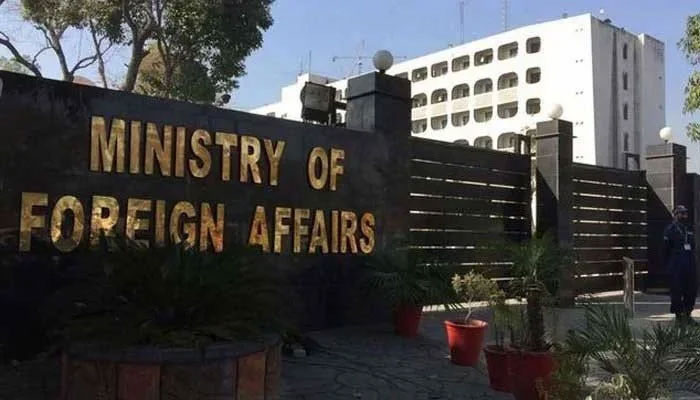
Islamabad has strongly censured New Delhi over the “reckless” and “hate-driven” remarks made by Indian Prime Minister Narendra Modi against Pakistan, describing them as the product of “the theatrical flourish of a campaign rally rather than the sobriety expected of the leader of a nuclear-armed state”.
“The hate-driven invocation of violence in his remarks is deeply disturbing, not only for its content but for the dangerous precedent it sets in a region already burdened by volatility,” the Foreign Office in Islamabad said in a statement issued on social media on Tuesday.
“We regret the continued erosion of maturity and decorum in Indian statecraft.”
The Indian premier had said that those who fanned terror had not even imagined in their dreams how difficult it is to face Modi.
“Ever since Pakistan was born, it has focused on enmity with India, while we in India have focused on removing poverty, growth, and development,” he said while addressing a public rally in Dahod on Monday, the first day of his two-day visit to Gujarat.
Islamabad has strongly condemned the Indian prime minister’s comments during the Gujarat visit, describing them as “reckless” and provocative.
The Foreign Office stressed that the Indian leader’s remarks were deeply disturbing, adding: “This kind of inflammatory rhetoric goes against the core principles of the United Nations Charter.”
It added that all member states are obliged to resolve disputes peacefully and must refrain from the threat or use of force against the sovereignty and political independence of other nations.
Islamabad views Mr Modi’s comments as “reckless provocation” aimed at deflecting attention from what it described as “ongoing human rights violations and demographic engineering” in Indian Illegally Occupied Jammu and Kashmir (IIOJK).
At least 26 people were killed in the April 22 attack on tourists in the scenic Pahalgam area of IIOJK. Following the incident, India blamed Pakistan without providing evidence, a claim denied by Islamabad. In response, India launched a series of small-scale cross-border attacks, followed by missile strikes inside Pakistan.
Addressing students from various universities in Khyber Pakhtunkhwa on 25 May, Director General of Inter-Services Public Relations (ISPR) Lieutenant General Ahmed Sharif Chaudhry said that all strategies devised by India and Prime Minister Narendra Modi had been systematically disproven by Pakistan’s decisive actions.
He detailed Pakistan’s retaliatory measures following the 6–7 May incidents, revealing that the Chief of Army Staff (COAS), Field Marshal Syed Asim Munir, ordered strikes on 26 Indian locations.
Pakistan’s armed forces subsequently launched a large-scale military action, named Operation Bunyan-um-Marsoos, targeting several Indian military sites across multiple regions on 10 May.
The conflict, which was provoked by India, lasted for at least 87 hours and concluded the same day with a ceasefire agreement brokered by the United States.
In today’s statement, Islamabad reaffirmed its credentials as a leading contributor to UN peacekeeping and its long-standing cooperation in global counter-terrorism efforts, stating that these speak louder than “any hostile soundbite”.
The Foreign Office also criticised the growing influence of Hindutva ideology in India, alleging a rise in majoritarianism and religious intolerance.
“If extremism is indeed a concern for the Indian government, it would do well to turn inward—towards the alarming rise of majoritarianism, religious intolerance, and the systematic disenfranchisement of minorities under the increasingly brutal Hindutva ideology,” the statement read.
Islamabad reiterated its commitment to peace based on mutual respect and sovereign equality, while making it clear that any threat to Pakistan’s security or territorial integrity would be met with a firm and proportionate response.
“We will act in accordance with Article 51 of the UN Charter, which recognises the right of self-defence,” it stated.
Islamabad also called on the international community to take serious note of what it described as “India’s escalating rhetoric”, warning that it undermines regional peace and jeopardises the possibility of meaningful dialogue.



